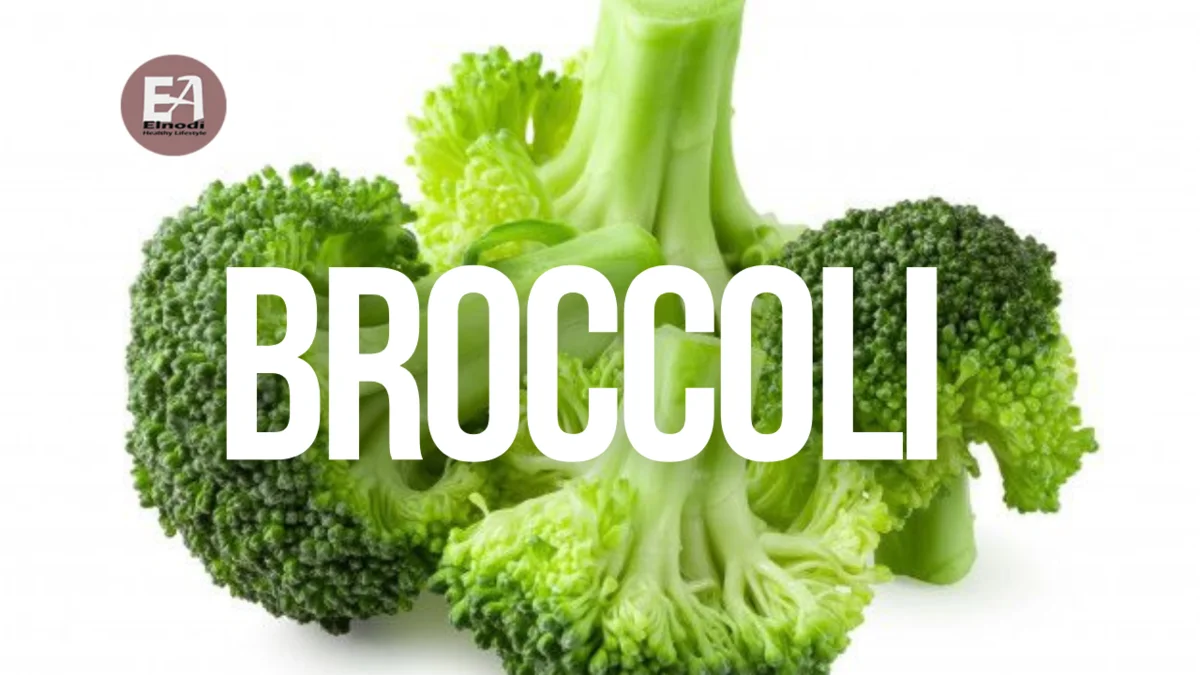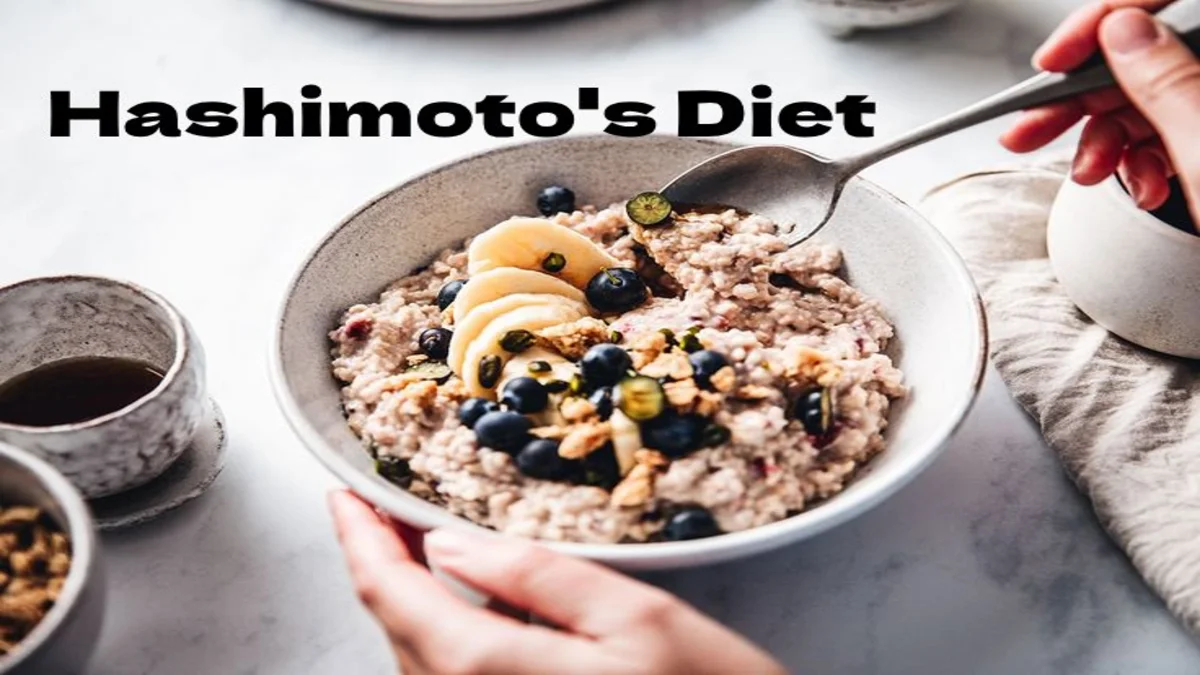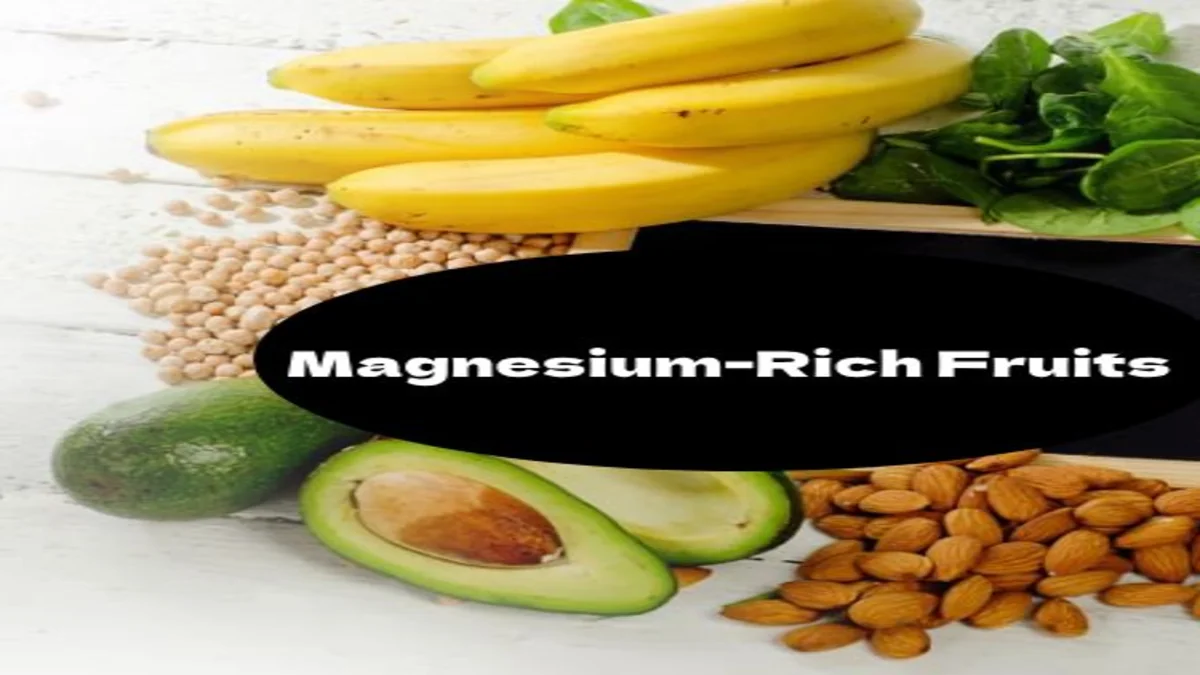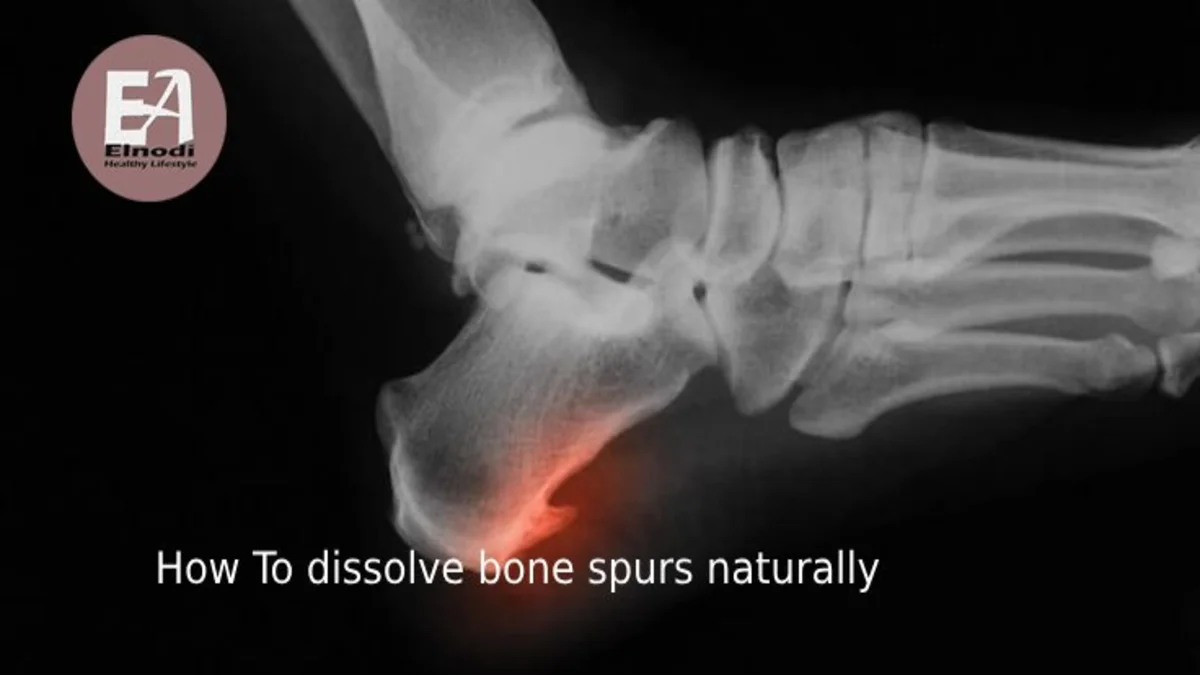Broccoli benefits are often overlooked or underrated compared to other more popular veggies. However, this green powerhouse is packed with essential vitamins, minerals, and antioxidants that can greatly contribute to a healthier lifestyle.
From boosting our immune system to supporting digestion and even promoting heart health, broccoli has much more to offer than meets the eye.
What is Broccoli?
Broccoli is a green vegetable that belongs to the cruciferous vegetable family, which also includes cauliflower, cabbage, Brussels sprouts, and kale. It is known for its tightly clustered, edible flower heads, which are usually green in color. Broccoli is rich in various nutrients.
Broccoli nutrition Profile
| Nutrient | Amount per 100g |
|---|---|
| Calories | 55 kcal |
| Protein | 3.7 g |
| Carbohydrates | 11.2 g |
| Dietary Fiber | 2.6 g |
| Sugars | 1.7 g |
| Fat | 0.6 g |
| Vitamins and Minerals | |
| Vitamin C | 89.2 mg |
| Vitamin K | 101.6 mcg |
| Folate (B9) | 63 mcg |
| Potassium | 316 mg |
| Calcium | 47 mg |
| Iron | 0.7 mg |
| Magnesium | 21 mg |
| Phosphorus | 66 mg |
These values are approximate and can vary based on factors such as cooking methods and the specific variety of broccoli. Additionally, the table provides a snapshot of the primary nutrients found in broccoli, showcasing its nutritional richness.
Broccoli Benefits
1. Rich in Nutrients
Broccoli benefits is a good source of essential vitamins and minerals, including vitamin C, vitamin K, folate, potassium, and fiber.
2. Antioxidant Properties
Broccoli benefits It contains antioxidants such as sulforaphane, which may help neutralize harmful free radicals in the body, reducing oxidative stress and inflammation.
3. Heart Health
The fiber, potassium, and antioxidants in broccoli contribute to heart health by helping to lower cholesterol levels and blood pressure.
4. Cancer Prevention
Sulforaphane in broccoli has been studied for its potential anti-cancer properties, with some research suggesting it may help inhibit the development of certain types of cancer.
5. Digestive Health
The fiber content in broccoli promotes regular bowel movements and supports a healthy digestive system.
6. Bone Health
Broccoli benefits is a good source of vitamin K and calcium, essential for maintaining strong and healthy bones.
7. Immune Support
The combination of vitamins, minerals, and antioxidants in broccoli contributes to a strengthened immune system, helping the body defend against infections.
8. Weight Management
Broccoli benefits are low in calories and high in fiber, making it a satisfying and nutritious choice for those looking to manage their weight.
9. Blood Sugar Control
The fiber and antioxidants in Broccoli benefits may contribute to better blood sugar control, making it a beneficial food for individuals with diabetes.
10. Eye Health
Broccoli benefits It contains lutein and zeaxanthin, antioxidants that support eye health and may help prevent age-related macular degeneration.
Broccoli benefits for skin
Broccoli benefits offer several benefits for the skin, thanks to its rich nutritional profile. Here are some ways in which broccoli can contribute to healthier skin:
- Vitamin C Boost: Broccoli is a great source of vitamin C, which is essential for collagen production. Collagen is a protein that provides structure to the skin, helping to maintain its elasticity and firmness. (1)
- Antioxidant Protection: The presence of antioxidants in broccoli, including vitamin C, beta-carotene, and sulforaphane, helps protect the skin from oxidative stress. Antioxidants neutralize free radicals, reducing the risk of premature aging and skin damage.
- Skin Repair and Renewal: Vitamin K in broccoli plays a role in skin health by supporting the body’s natural process of blood clotting and wound healing. It may also help reduce the appearance of dark circles under the eyes. (2)
- Sun Damage Prevention: Sulforaphane, a compound found in cruciferous vegetables like broccoli, has been studied for its potential to protect the skin against the harmful effects of UV radiation. While not a substitute for sunscreen, incorporating broccoli into your diet may provide additional skin protection. (3)
- Hydration and Detoxification: Broccoli is a hydrating food with a high water content, which contributes to overall skin hydration. Additionally, its fiber content supports the body’s natural detoxification processes, helping to eliminate toxins from the body that could affect the skin.
- Reduced Inflammation: The anti-inflammatory properties of broccoli may help reduce skin inflammation, making it beneficial for individuals with inflammatory skin conditions such as acne or eczema.
- Brighter Complexion: The combination of vitamins and minerals in broccoli promotes a healthy, radiant complexion. Regular consumption can contribute to a more even skin tone and a natural glow.
Consider including broccoli in your diet through a variety of foods, such as salads, stir-fries, or steamed vegetables, to optimize its benefits for your skin. Broccoli extract applied topically or incorporated into skincare products may also offer added skin advantages. Individual reactions can differ, just like with any dietary or skincare changes, so it’s best to keep an eye on how your skin reacts and see a dermatologist if you have any particular skin issues.
Broccoli benefits for pregnancy
Broccoli is a nutritious vegetable that can offer various benefits during pregnancy, providing essential vitamins and minerals that support both the mother and the developing fetus. Here are some of the benefits of including broccoli in a pregnant woman’s diet:
- Folate Content: Broccoli is a good source of folate (vitamin B9), a crucial nutrient during pregnancy. Folate plays a key role in the early development of the neural tube, helping prevent neural tube defects in the developing fetus. (4)
- Vitamin C for Immune Support: Broccoli is rich in vitamin C, which supports the immune system. Maintaining a healthy immune system is important during pregnancy to protect both the mother and the developing baby.
- Iron for Red Blood Cell Formation: Iron is essential for the formation of red blood cells, and pregnant women often need increased iron intake. While plant-based iron (non-heme iron) from broccoli is not as easily absorbed as iron from animal sources, consuming vitamin C-rich foods alongside iron-rich foods can enhance absorption.
- Calcium for Bone Development: Calcium is crucial for the development of the baby’s bones and teeth. While broccoli is not a high-calcium food, it contributes to overall calcium intake when combined with other dairy or calcium-rich foods.
- Fiber for Digestive Health: Pregnancy hormones can sometimes lead to constipation. Broccoli, being a good source of fiber, can help promote healthy digestion and alleviate constipation.
- Antioxidants for Cellular Protection: Broccoli contains antioxidants, such as vitamin C and beta-carotene, which help protect cells from damage caused by free radicals. This cellular protection is beneficial for both the mother and the developing baby.
- Hydration and Nutrient Support: Broccoli has a high water content, contributing to overall hydration. Staying hydrated is important during pregnancy to support the increased blood volume and amniotic fluid.
- Low Calorie and Nutrient Density: Broccoli is a nutrient-dense, low-calorie food, making it a healthy choice for pregnant women who need to ensure they get essential nutrients without excessive caloric intake.
Broccoli should be included in a larger variety of nutrient-rich foods, as a well-balanced and diverse diet is essential during pregnancy. In order to make sure they satisfy their unique dietary demands during this crucial period, pregnant women should speak with their healthcare practitioners.
Broccoli benefits for hair
While broccoli is not a direct cure for hair-related issues, its nutritional profile can contribute to overall hair health. Here are some potential benefits of including broccoli in your diet for healthier hair:
- Vitamin C for Collagen Production: Broccoli is rich in vitamin C, which is essential for the synthesis of collagen. Collagen provides structure to the hair, making it strong and less prone to breakage. (5)
- Vitamin A for Sebum Production: The vitamin A content in broccoli supports the production of sebum, the natural oil that moisturizes the scalp and keeps hair healthy. A well-moisturized scalp helps prevent dryness and flakiness.
- Vitamin E for Scalp Health: Broccoli contains vitamin E, an antioxidant that can contribute to a healthy scalp. A healthy scalp is important for promoting hair growth and maintaining the overall condition of the hair. (6)
- Iron for Healthy Hair Growth: Iron deficiency is linked to hair loss. Broccoli provides a source of iron, which is important for the transportation of oxygen to the hair follicles, supporting healthy hair growth.
- Folate for Cell Division: Folate, or vitamin B9, found in broccoli, plays a role in cell division, including the cells responsible for hair growth. Adequate folate levels may contribute to healthy hair.
- Omega-3 Fatty Acids for Hair Strength: While not abundant in broccoli, the presence of omega-3 fatty acids can contribute to hair strength. Omega-3s are essential for maintaining the integrity of hair strands.
- Antioxidants for Scalp Protection: The antioxidants in broccoli, including sulforaphane, may help protect the scalp from oxidative stress. This can be beneficial for maintaining a healthy environment for hair growth.
It’s crucial to remember that while nutrition might have an impact on hair health, other elements like heredity, general health, and hair care habits also matter a lot. Eating a range of nutrient-dense foods, like broccoli, can improve your general health and well-being, which includes the condition of your hair. A comprehensive approach to healthy hair also includes managing stress, drinking plenty of water, and adhering to proper hair care methods.
How Can Broccoli Aid in Losing Weight?
It is related to helping with weight loss. Many people eat the stalk and its dark green florets; some explanations for this include: (7)
- Broccoli benefits is a vegetable high in fiber. Foods high in fiber tend to slow down digestion. You feel “full” for a longer period because the soluble fiber in your digestive system forms a gel after absorbing water.
- Furthermore, your body uses the hormone ghrelin to tell you when it is hungry. Additionally, the fiber helps to further decrease your hunger by lowering the release of ghrelin.
- Eating tiny amounts of it can help you feel satisfied for a long time.
- Because it has few calories, it can also be consumed in greater amounts. As such, it’s a great choice for a snack.
- 90% of broccoli is water, and it also contains supplementary elements that help with weight loss.
- It has the extra benefit of having very little fat in it.
Broccoli side effects
While Broccoli benefits is generally considered a highly nutritious and safe vegetable to include in your diet, some individuals may experience certain side effects, especially when consumed in excessive amounts. Here are potential side effects associated with broccoli:
- Digestive Discomfort: Broccoli contains fiber, which can cause gas and bloating in some people, particularly if they are not accustomed to a high-fiber diet. Gradually increasing your fiber intake and cooking broccoli may help reduce these effects. (8)
- Thyroid Interference: Broccoli is a cruciferous vegetable and contains compounds called goitrogens. In very high amounts, goitrogens may interfere with thyroid function by affecting iodine absorption. However, this is more likely to be a concern for individuals with an existing thyroid condition when consuming extremely large quantities.
- Allergic Reactions: While rare, some individuals may be allergic to broccoli. Allergic reactions can range from mild symptoms, such as itching or swelling, to more severe reactions like difficulty breathing. If you suspect an allergy, seek medical attention.
- Blood Thinning: Broccoli is a good source of vitamin K, which plays a crucial role in blood clotting. Individuals taking blood-thinning medications (anticoagulants) should be consistent in their vitamin K intake to maintain the effectiveness of their medication. Consult with a healthcare professional for personalized advice.
- Kidney Stones: Broccoli contains oxalates, compounds that can contribute to the formation of kidney stones in susceptible individuals. If you have a history of kidney stones, it’s advisable to moderate your intake of high-oxalate foods, including broccoli.
Broccoli recipes
1. Roasted Garlic Parmesan Broccoli:
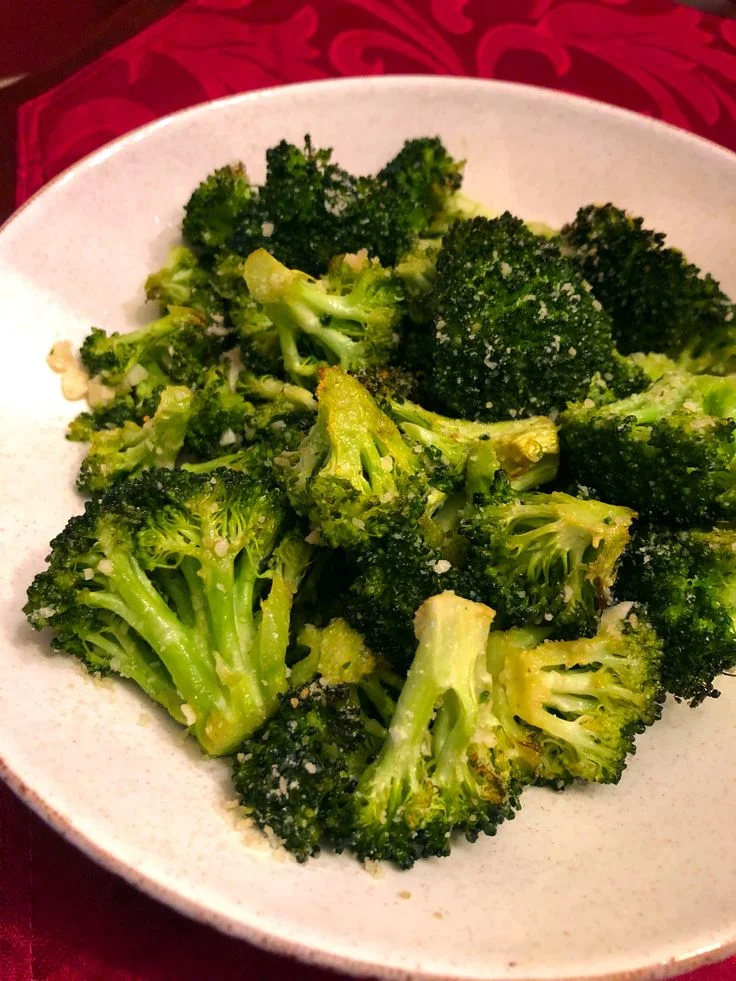
Ingredients:
- 1 lb broccoli florets
- 2 tbsp olive oil
- 3 cloves garlic, minced
- Salt and pepper to taste
- 1/3 cup freshly grated Parmesan cheese
Instructions:
- Preheat the oven to 425°F (220°C).
- Toss broccoli florets with olive oil, minced garlic, salt, and pepper in a large bowl.
- Spread the broccoli in a single layer on a baking sheet.
- Roast for 20-25 minutes, or until the edges are crispy and golden.
- Sprinkle with freshly grated Parmesan cheese before serving.
2. Chicken and Broccoli Stir-Fry:

Ingredients:
- 1 lb boneless, skinless chicken breasts, cut into bite-sized pieces
- 2 cups broccoli florets
- 1 red bell pepper, thinly sliced
- 3 tbsp soy sauce
- 2 tbsp oyster sauce
- 1 tbsp sesame oil
- 2 cloves garlic, minced
- 1 tsp ginger, grated
- Cooked rice or noodles for serving
Instructions:
- In a wok or skillet, heat oil over medium-high heat. Add chicken and cook until browned and cooked through.
- Add broccoli and bell pepper, stir-frying for 3-4 minutes until vegetables are tender-crisp.
- In a small bowl, mix soy sauce, oyster sauce, sesame oil, garlic, and ginger.
- Pour the sauce over the chicken and vegetables, tossing to coat.
- Serve over cooked rice or noodles.
3. Creamy Broccoli and Cheddar Soup:

Ingredients:
- 1 lb broccoli, chopped
- 1 onion, diced
- 2 cloves garlic, minced
- 3 cups vegetable or chicken broth
- 1 cup milk or cream
- 1 cup shredded cheddar cheese
- Salt and pepper to taste
Instructions:
- In a large pot, sauté onions and garlic until softened.
- Add chopped broccoli and broth, and simmer until the broccoli is tender.
- Use an immersion blender to blend the soup until smooth.
- Stir in milk or cream and bring to a gentle simmer.
- Add shredded cheddar cheese, stirring until melted. Season with salt and pepper.
4. Quinoa and Broccoli Salad:
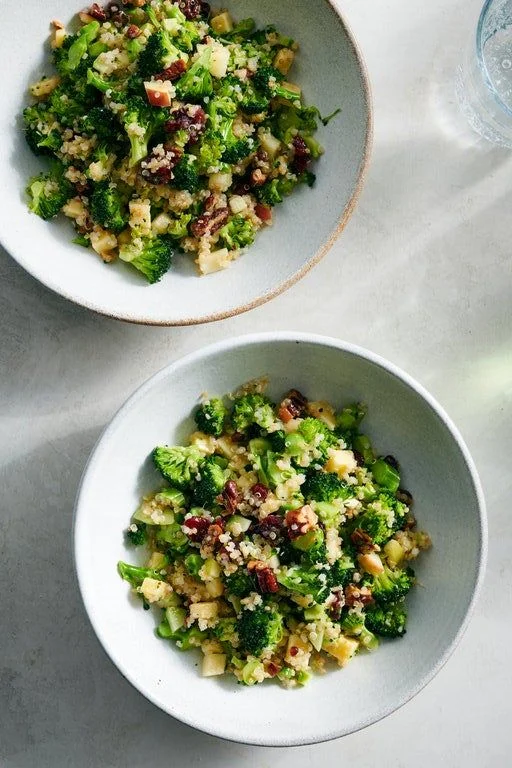
Ingredients:
- 1 cup quinoa, cooked and cooled
- 1 lb broccoli florets, blanched
- 1 cup cherry tomatoes, halved
- 1/2 cup feta cheese, crumbled
- 1/4 cup fresh parsley, chopped
- 3 tbsp olive oil
- 2 tbsp lemon juice
- Salt and pepper to taste
Instructions:
- In a large bowl, combine quinoa, blanched broccoli, cherry tomatoes, feta cheese, and parsley.
- In a small bowl, whisk together olive oil, lemon juice, salt, and pepper.
- Pour the dressing over the salad and toss to combine.
- Serve chilled.
5. Broccoli and Cheddar Stuffed Baked Potatoes:

Ingredients:
- 4 large russet potatoes
- 1 lb broccoli florets, steamed
- 1 1/2 cups shredded cheddar cheese
- Salt and pepper to taste
Instructions:
- Bake or microwave potatoes until tender.
- Steam broccoli florets until crisp-tender.
- Cut open the potatoes, and fluff the insides with a fork.
- Mix steamed broccoli with shredded cheddar cheese.
- Fill each potato with the broccoli and cheddar mixture. Season with salt and pepper.
Summary
One of the few underappreciated veggies that has a wealth of vital minerals and strong medicinal potential is broccoli.
In addition, it is low in calories and high in fiber, vitamins, minerals, and antioxidants—all of which are beneficial to health in different ways. As a result, you ought to include broccoli in your diet.
Broccoli benefits have a large global following. In India, it is not yet widely used, though. Furthermore, additional photochemical studies on this superfood are needed.
Nonetheless, the assessments that have been published demonstrate broccoli’s remarkable potential for anti-cancer therapeutic qualities.
FAQs
what does broccoli do for your body?
is broccoli a superfood?
is broccoli better for you cooked or raw?
References
- https://www.ncbi.nlm.nih.gov/pmc/articles/PMC10459432/ ↩︎
- https://www.ncbi.nlm.nih.gov/pmc/articles/PMC7830254/ ↩︎
- https://www.ncbi.nlm.nih.gov/pmc/articles/PMC3280724/ ↩︎
- https://www.parents.com/pregnancy/my-body/nutrition/folate-foods/ ↩︎
- https://ozelhair.com/introduction-to-the-benefits-of-broccoli-for-hair ↩︎
- https://www.ncbi.nlm.nih.gov/pmc/articles/PMC10376324/ ↩︎
- https://www.healthifyme.com/blog/broccoli-for-weight-loss/ ↩︎
- https://www.ncbi.nlm.nih.gov/pmc/articles/PMC8025206/ ↩︎


